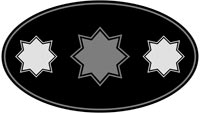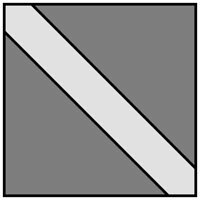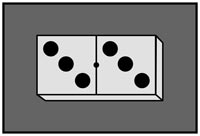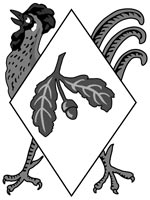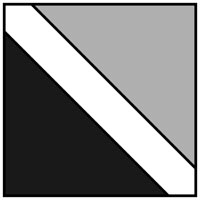Regimental Timeline
The Second or The Queen's Royal Regiment
The Great War: 1916
1916
Formation Signs
The following examples were wore by The Queen's Royal (West Surrey) Regiment and The East Surrey Regiment:-
|
|
|
2nd Division |
5th Division |
7th Division |
|
|
|
12th Eastern Division |
18th Eastern Division |
33rd Division |
|
|
|
40th Division |
41st Division |
47th (2nd London) |
Formation signs were first worn during the 1914 - 1918 war. Their introduction was brought about by the necessity for some form of distinguishing mark or sign to aid recongnition of Corps and Divisional vehicles and personel.
Prior to their appearance, the troops tended to think only of their own particular regiment or Corps and were not always aware of the part it was playing against the vast background of the operations on the Western and other Fronts. When signs were adopted, around the middle of 1916, the men began to take a certain pride in belonging to the formation to which their regiment were a part. Signs were thought to be a new kind of heraldry. The "Battle Patch", as they became known, taken into use for pratical military reasons had, by the later stages of the war, engendered a strong Esprit de Corps. The signs took the form of "Heraldic", "Symbolic", "Animal", or "Geometric". The design was left to each formation and many reflected the choice of the Corps or Divisional Commander. During the Great War, the signs were worn, either on the sleeve, just below the shoulder, or on the back of the tunic, immediately below the collar. Home based units did not wear fomation signs. The signs were also used on vehicles.
| The Queen’s (Royal West Surrey) Regiment | |
1st Battalion (2nd Foot) |
|
1st January - 12th July |
La Bassée. |
Battle of the Somme. |
|
Moves to the Somme Battlefield. |
|
Assembly area between Fricourt and Mametz, strength 25 officers, 697 men. |
|
Offensive operations near High Wood. Attacks fail. |
|
In reserve. |
|
Delville Wood; battalion achieves all its objectives. |
|
In trenches at Cuinchy. Offensive operations. Total casualties 8 officers and 226 men killed, missing and wounded. |
|
Moves to Rancourt – Bouchavesnes. Drafts totalling 297 men join, but 209 casualties from trench foot, due to foul weather and conditions in trenches. |
|
2nd Battalion (2nd Foot) |
|
28th January |
Moves to Fricourt.n re-forms to strength of 29 officers, 824 men. Moves to Laventie. |
Battle of the Somme. |
|
Moves to assembly area near Bois de Tailles. |
|
Bn attacks towards Danzig Alley, north of Mametz. Actions of Albert and Bazentin. Objectives secured. Casualties 13 officers and 307 men killed, wounded and missing. |
|
In reserve. |
|
High Wood. |
|
In reserve. |
|
Delville Wood. |
|
Action at Guilemont. |
|
Ypres. |
|
In reserve at Bertrancourt and Louvencourt. |
|
Special Reserve |
|
3rd Battalion (2nd Royal Surrey Militia) |
|
28th February |
Moves to Sittingbourne. Reorganised into A Coy (BEF unfit for service), B,C, D Coys (Drafting), 1, 2, 3, 4 Training Companies. |
Territorial Force |
|
1st/4th Battalion |
|
January - February |
Mohmand Campaign, NW Frontier India. |
February - December |
Peshawar and Lahore. |
2nd/4th Battalion |
|
January - February |
Re-forms at Warden, Egypt. |
May |
Ismailia and the Suez Canal. |
August - December |
Kantara and Rumani. |
3rd/4th Battalion |
|
Home service. |
|
4th/4th Battalion |
|
8th April |
Absorbed into 4th (Reserve) Battalion. |
4th (Reserve) Battalion |
|
8th April |
Formed from 4th/4th Battalion. Home Service. |
1st September |
Absorbs 5th (Reserve) Battalion. |
1st/5th Battalion |
|
11th January |
Mesopotamia. Joins 12 Infantry Brigade (12th Indian Division) at Nasariyeh. |
12th July |
Operations against the Turks in Mesopotamia. Strength 27 officers, 1,020 men. |
2nd/5th Battalion |
|
Home Service. |
|
3rd/5th Battalion |
|
8th April |
Redesignated as 5th (Reserve) Battalion. |
5th (Reserve) Battalion |
|
1st September |
Absorbed into 4th (Reserve) Battalion. |
1st/22nd (County of London) Battalion the London Regiment |
|
September |
Battle of High Wood. |
Ocober |
Battle of Warlencourt. |
2nd/22nd (County of London) Battalion the London Regiment |
|
Moves to France. Vimy Ridge. |
|
22nd TF Reserve Battalion |
|
1st September |
King’s Lynn. Absorbs 24th TFRB. |
24th (County of London) Battalion The London Regiment |
|
January |
Hohenzollern Redoubt; Loos. |
March - May |
Souchez; Vimy Ridge. |
July |
Angres. |
1st July |
Moves to the Somme battlefield. |
15th September |
Battle of High Wood. |
14th October |
Battle of Butte de Warlencourt. |
17th October |
Moves to Ypres. |
December |
Hill 60 Sector. |
2nd/24th (County of London) Battalion The London Regiment |
|
January |
Moves to Warminster. |
6 (Reserve) Infantry Brigade of 2nd London (Reserve) Division becomes 181 Infantry Brigade (60th (London) Division). |
|
Inspected by HM King George V. |
|
Embarks at Southampton for Le Havre. |
|
In trenches, Vimy Ridge. |
|
Embarks at Marseilles. |
|
Arrives in Salonika. |
|
3rd/24th (County of London) Battalion The London Regiment |
|
Becomes 24th Territorial Force Reserve Battalion. |
|
24th Territorial Force Reserve Battalion |
|
Moves to Wells-next-the-Sea. |
|
Absorbed into 22nd TF Reserve Battalion. |
|
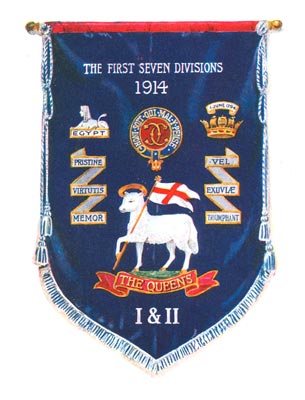
The First Seven Divisions
The Banner was displayed at a
Choral Commemoration
of the First Seven Divisions
at the Royal Albert Hall, 15th December 1917.
Service Battalions |
|
6th Battalion |
|
February - April |
Returns to Hohenzollern Redoubt for mining and operations in trenches. |
April - June |
In reserve. |
16th - 18th June |
Moves to the Somme battlefield. |
2nd July |
Attack near Albert fails. Casualties 10 officers, 294 men killed, wounded and missing. |
July |
Offensive operations and duty in trenches near Arras. |
August |
In reserve. |
27th September |
Returns to the Somme battlefield. |
7th October |
Attack on Gueuedecourt. |
November - December |
In trenches in Beaumetz and Ambrimes sectors. |
7th Battalion |
|
1st July |
Battle of the Somme. |
11th - 13th July |
Capture of Trônes Wood. Casualties 13 officers, 216 men killed, wounded and missing. |
28th September |
Joins 53 Infantry Brigade; attack on Schwaben redoubt. Casualties 11 officers, 384 men killed, wounded and missing. |
October - November |
Battle of Épéhy; breaking of the Hindenburg Line. |
December |
Re-forms at Abbeville. |
8th Battalion |
|
January |
Hooge salient. |
March - July |
Dranoutre. |
Battle of the Somme. |
|
August |
In trenches, Morlancourt sector. |
1st - 5th September |
Delville Wood. |
September
- |
Vimy Ridge sector. |
9th Battalion |
|
1st August |
Transfers all manpower to 11th East Surreys. Disbanded. |
10th (Battersea) Battalion |
|
5th May |
Embarks at Southampton for Le Havre. Moves to Ploegsteert sector (Flanders). |
September |
Moves to Pommier redoubt. |
Battle of the Somme. |
|
15th September |
Attack on Flers. Casualties 18 officers, 303 men killed, wounded and missing. |
October - December |
In reserve. |
11th (Lambeth) Battalion |
|
3rd May |
Embarks at Southampton for Le Havre. Strength 33 officers, 924 men. Moves to Strazeele. |
June - August |
Le Bizet. |
Battle of the Somme. |
|
15th September |
Attack on Flers. |
October - December |
Mametz. |
12th (Reserve) Battalion |
|
1st September |
Transferred out of the Regiment as 97th Battalion Territorial Force Reserve. |
16th (Home Service) Battalion |
|
11th November |
Raised at Farnham. |
19th Battalion |
|
Home Service on coast defences. Absorbs 70th Provisional Battalion and supplies drafts for overseas service. |
|
Labour Battalions |
|
13th Battalion |
|
6th July |
Raised at Balmer. |
14th Battalion |
|
16th August |
Raised at Crawley. |
15th Battalion |
|
12th September |
Raised at Crawley. |
17th Battalion |
|
8th November |
Raised at Crawley. |
18th Battalion |
|
November |
Raised at Purfleet. |
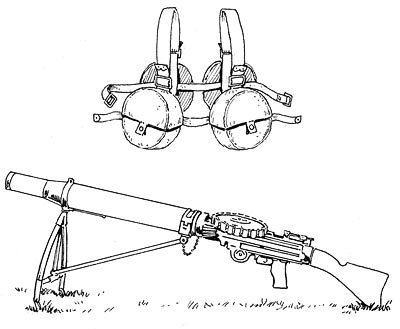
The Lewis Light Machine Gun and Spare Magazine Carriers.
